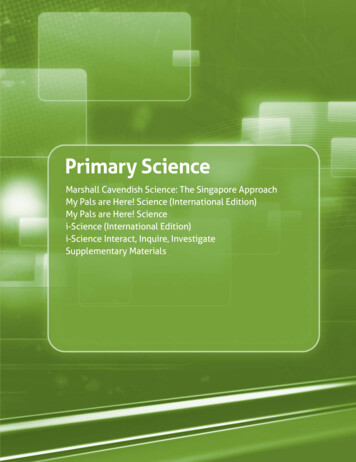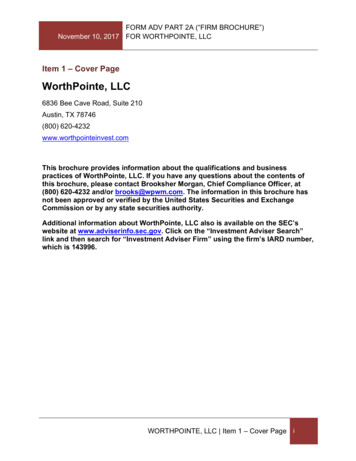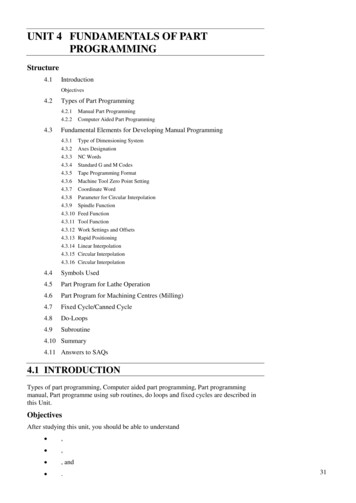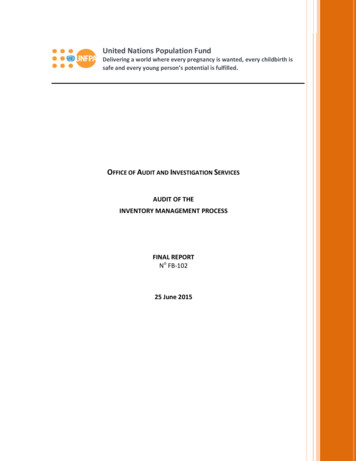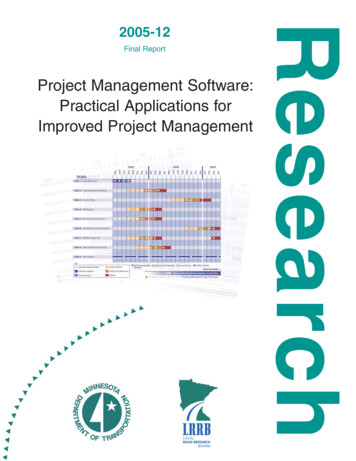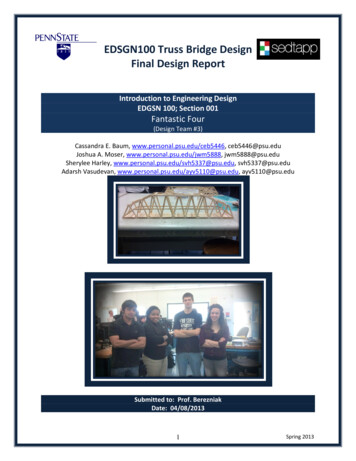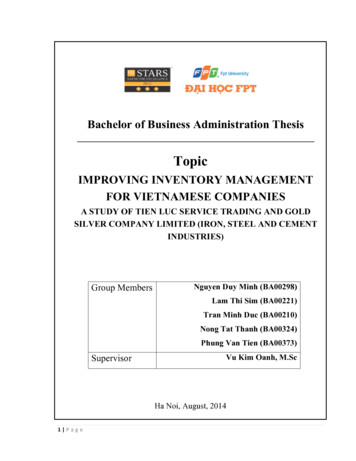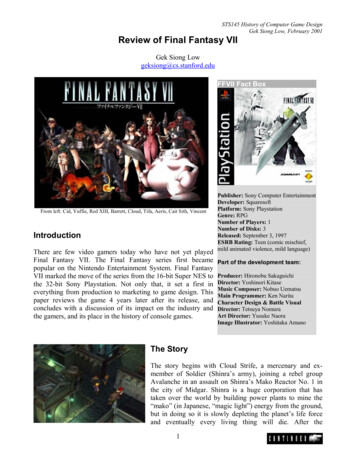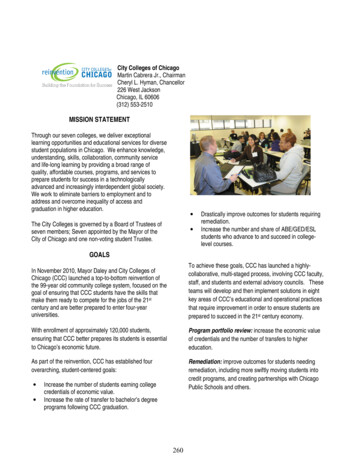
Transcription
City Colleges of ChicagoMartin Cabrera Jr., ChairmanCheryl L. Hyman, Chancellor226 West JacksonChicago, IL 60606(312) 553-2510MISSION STATEMENTThrough our seven colleges, we deliver exceptionallearning opportunities and educational services for diversestudent populations in Chicago. We enhance knowledge,understanding, skills, collaboration, community serviceand life-long learning by providing a broad range ofquality, affordable courses, programs, and services toprepare students for success in a technologicallyadvanced and increasingly interdependent global society.We work to eliminate barriers to employment and toaddress and overcome inequality of access andgraduation in higher education. The City Colleges is governed by a Board of Trustees ofseven members; Seven appointed by the Mayor of theCity of Chicago and one non-voting student Trustee. Drastically improve outcomes for students requiringremediation.Increase the number and share of ABE/GED/ESLstudents who advance to and succeed in collegelevel courses.GOALSIn November 2010, Mayor Daley and City Colleges ofChicago (CCC) launched a top-to-bottom reinvention ofthe 99-year old community college system, focused on thegoal of ensuring that CCC students have the skills thatmake them ready to compete for the jobs of the 21stcentury and are better prepared to enter four-yearuniversities.To achieve these goals, CCC has launched a highlycollaborative, multi-staged process, involving CCC faculty,staff, and students and external advisory councils. Theseteams will develop and then implement solutions in eightkey areas of CCC’s educational and operational practicesthat require improvement in order to ensure students areprepared to succeed in the 21st century economy.With enrollment of approximately 120,000 students,ensuring that CCC better prepares its students is essentialto Chicago’s economic future.Program portfolio review: increase the economic valueof credentials and the number of transfers to highereducation.As part of the reinvention, CCC has established fouroverarching, student-centered goals:Remediation: improve outcomes for students needingremediation, including more swiftly moving students intocredit programs, and creating partnerships with ChicagoPublic Schools and others. Increase the number of students earning collegecredentials of economic value.Increase the rate of transfer to bachelor’s degreeprograms following CCC graduation.261260
Adult Education: improve programs so that students areon the pathway to completion of their program andsuccessfully transfer to college credit courses.Entrepreneurship Workshops: Provides opportunitiesfor residents to learn the basics of entrepreneurships,such as Creating a Successful Business Plan (Online) andStarting Your Own BusinessStudent Support and Pathways: improve advising,tutoring, job placement, and transfer and otherwraparound supports.Computer Literacy Workshops for SeniorsBasic computer skills training targeted to senior residents.Faculty & Staff Development: create developmentprograms that better support faculty and staff in theirservice to students, establish performance goals andevaluation methods.Sustainable Urban Horticulture ProgramIn partnership with the Chicago Botanic Gardens andWindy City Harvest, participants acquire hands-onexperience with sustainable vegetable production andlearn essential business skills.Operational Excellence and Optimization: improve thereturn on non-instructional related investments, and buildan investment strategy that supports studentsuccess.Washburne Culinary InstituteWashburne Culinary Institute offers an affordable, highquality culinary education. Certificate and AssociateDegree programs prepare our graduates with skills forimmediate employment.Technology: drive significant improvement in bothinstructional and non-instructional technology and dataintegrity to ensure students, faculty and staff have thetools necessary to succeed.Dawson Technical Institute/Kennedy King CollegeDawson Technical Institute is an Occupational SkillsCenter for the Construction Trades and it currently offersto the residents of Chicago courses in construction,including Air Conditioning and Refrigeration, BricklayerBasic Certificate, Building Energy Technologies, ConcreteMasonry, Construction Carpentry, ConstructionManagement, Construction Painter, Overhead ElectricalLine Worker, Plumbing and Fire Protection and Welder.Strategic Capital Planning and Investments: modernizefacilities and ensure that updated resources andtechnologies are available to prepare students for successin their new careers.Critical Programs/Services to Assist ResidentsCCC provides Baccalaureate Transfer, Workforce,Adult Education, and Continuing Education. Listedbelow are examples of services provided to assistresidents.The Adult Education Program:The CCC Adult Education program offers courses foradults who lack sufficient mastery of basic educationalskills to enable the individuals to function effectively insociety. This program is designed for those who do nothave a secondary school diploma or its recognizedequivalent , and have not achieved an equivalent level ofeducation or are unable to speak, read, or write theEnglish language.Foreclosure Prevention WorkshopsThis free workshop is for homeowners who want to knowmore about the current economic situation and the effecton home ownership.People’s Law SchoolIn concert with the Chicago Legal Clinic, the City Collegesof Chicago offers free legal workshops in whichdistinguished judges and or lawyers explain in layman’sterms how the legal system works and how it can helpyou.262261
Organizational ChartBoard ofTrusteesChancellorCheryl HymanGeneral CounselJames M. ReillyChief of StaffRon AndersonOffice of the ChancellorInspector GeneralEthicsGovernmental AffairsInternal ellorAlvin BisaryaViceChancellorJoyce CarsonAcademicAffairsStrategy chViceChancellorJoseph D.LopezDevelopmentFinanceSecurityVice ChancellorCraig LynchVice ChancellorDiane MinorVice ChancellorMichael MutzVice ChancellorPatricia dentEngagementHumanResources263262Vice ChancellorJamesFrankenbachOperations
FY 2011 Operating Budget OverviewThe Fiscal Year 2011 Budget is prepared to support the new leadership’s mission of reinventing the CityColleges of Chicago to operate as one cohesive, integrated district. CCC will provide rational programs withmeasures and outcomes, more effective remediation to prepare students for college level courses, strongeralliance with Business partners for relevant program offerings that will result in student job placements,enhanced system wide articulation agreements with four year institutions (like the one recently executedwith the University of Illinois at Chicago (UIC)) for effective student transfer to a four year university, andincreased accountability across the board to insure delivery of quality programs and services. The FY 2011 operating budget is balanced and totals 454.4 millionIncludes 139 million for capital. A Capital Advisory Committee created to assess needsCity Colleges : Reinvention towards a new operating modelo Reprogrammed FY11 appropriationso Budgeted funds for reorganization and to address updated marketplace requirements,student experience and technology needs.Approved 3.0 million in property tax levy reduction to help provide relief to city residents.“Right sizing” non-instructional staff at colleges and District Office.No Salary increase for all non-bargained for employeesReduce supplies, travel and other expenses by approximately 4 millionFinancial Challenges. City Colleges continues to face numerous challenges as it prepares for anotherfiscal year. The State does not have a structurally balanced budget. This uncertainty of funding negativelyeffects sound long term financial planning practices and the development of strong collegeacademic programs. ICCB capital appropriations for Olive Harvey 30 million, Wright 5 million and Truman 5 millionhave been appropriated for but not yet funded. Basic infrastructure and equipment are old and inadequate, requiring high maintenance and repaircosts. Due to the aging building infrastructure at the City Colleges of Chicago, it is becomingincreasingly difficult to attract students. Currently, there is a deferred maintenance backlog thatexceeds 600 million. The intense competition for student recruitment from public and private four-year institutions, aswell as proprietary schools in Chicago continues. Many students entering the City Colleges system require additional assistance such as remedialmath, English and tutoring costing District over 20 million per year. State wide funding continues to remain fairly stagnant due to a lack of any inflationary increases instatewide funding for community colleges remaining well below FY2002 levels.Funding Resources Community colleges initially were intended to be funded equally from three sources: propertytaxes, state funding and tuition and fees. The State is not funding its share.o Total FY2011 resources equal 312.9 million from the following sources: 38% propertytaxes, 37% tuition and fees, 20% state, and 5% other.264263
113 million tuition and fee revenue which is up 12.2 over FY 2010 primarily due to double digitenrollment increases; as well as an increase in tuition from 79 to 87 per credit hour.Registration, activity and CDL fees increased 5, 20 and 5, respectively.The District receives restricted grants totaling approximately 67 million, with an additional 75million in financial aid passed through to students.Future year revenue gaps will be addressed by a multi-year forecast, meeting with students andstaff to discuss possible revenue enhancements and expenditure reductions; as well as carefullymonitoring expenditures and improving processes and efficiencies.State Funds The District expects to receive approximately 48 million in credit hour reimbursement this year. The District also receives approximately .4 million annually based on the amount of squarefootage occupied by the District. District will receive 15 million in alternative equalization grant to replace a flawed equalizationfunding formula. The District receives approximately 5.7 million in state adult education grants. These funds,combined with federal grants totaling approximately 3.2 million, help to support the adulteducation program.Where does the money go? Total District expenditures (all operating funds) for FY2011 are 312.9 (million broken down asfollows:o Sixty-seven percent ( 210 million) for salaries and fringe benefits of the approximately7,100 employees.o Fourteen percent ( 43 million) for serviceso Ten percent ( 33 million) for travel, fixed charges, scholarship and waivers; as well asother which includes expenses associated with reinvention initiativeo Nine percent ( 27 million) for supplies and utilitiesFund TypeFY2009AuditFY2010BudgetFY2011Budget11 vs. 10 Change%ChangeOperating Funds 262.7 294.5 312.9 Capital Fund18.875.0127.552.570.0%Debt Service Funds38.30.00.00.00.0% 450.5 492.1 581.9 89.818.2%UnrestrictedRestrictedTotal OperatingTotal Appropriation130.7265264
IMPORTANT DATESSpring 2011 TermJanuary 10, 2011 (Monday)January 10-15, 2011 (Monday – Saturday)January 17, 2011 (Monday)January 18, 2011 (Tuesday)January 18-22, 2011 (Tuesday – SaturdayJanuary 22, 2011 (Saturday)February 21, 2011 (Monday)March 16, 2011 (Wednesday)April 18-24, 2011 (Monday – Sunday)April 25, 2011(Monday)May 11, 2011 (Wednesday)May 14, 2011 (Saturday)August 22, 2011 (Monday)September 11, 2011 (Sunday)December 10, 2011 (Saturday)Activity/EventSpring 2011 Session beginsEarly registration for Spring 2011 SessionMartin Luther King HolidayFirst day of classes for Spring 2011 SessionOpen registration for Spring 2011 SessionSaturday classes beginPresidents’ Day (Holiday)Mid-Term date for Spring 2011 SessionSpring breakLast day for student initiated withdrawalsGraduation 2011Spring 2011Sesssions endsFall 2011 Session begins100TH Anniversary of City Colleges of ChicagoFall 2011 Session endsPrivate/Public Cooperative AgreementsPlum CafesThe Cafes provide food service to students at Harold Washington College (HWC).Compass Group, North AmericanCafeteria services for six colleges and the five Childcare Centers.French Pastry School, LLC (FPS)The FPS, in partnership with Kennedy-King College offers a 24 week Pastry cooking program, a 16 week Cakeprogram, and Continuing Education pastry courses.Becks BookstoreTwo locations provide bookstore services for Harold Washington and Truman College students.Follet Higher Education GroupIn-house bookstores located at Daley College, Kennedy-King College, Malcolm X/Colleges, Olive-Harvey College,and Wright College.Electrical Joint Apprenticeship Training TrustThe Board of Trustees in conjunction with Electrical Training Trust offers an Associate in Applied Science degreeprogram in Electrical Construction Technology at Richard J. Daley College (Arturo Valasquez Institute).Allied Health Care AgreementsNursing and Allied Health programs have a multitude of clinical agreements across the city.266265
Boards & Advisory BoardsTitleMemberResponsibilitiesChairman of the BoardMartin Cabrera Jr.Conducts the Board’s public andexecutive session meetings; Chair ofthe Executive CommitteeVice-ChairmanNancy ClawsonConducts meetings in the Chairman’sabsenceSecretaryTerry E. NewmanMaintains the minutes of closedsessions, board meetings and anyexecutive meetingsBoard MemberGloria CastilloChair of Committee of HumanResourcesBoard MemberVacantChair of Committee on Finance andAdministrative ServicesBoard MemberEverett RandBoard MemberRev. Albert D. Tyson, IIIChair of Committee on Academic andStudent ServicesStudent Board MemberGwen FulgernNon-voting267266
Capital ProjectsTable 1City Colleges of ChicagoFY2011 Approved Capital Projects( thousands)FY2011FY2012Total 1001,8001,26520,000835 24,000 1,1008003,90040,000500 46,300 1,2002,6005,16560,0001,335 70,300 30,7001,2751,3001,0002,7000300050030021,187100 30,7001,7751,6001,0002,70021,1874001,760 39,035800 22,8872,560 61,922 25,000FY20113001,0505,0004753002,500 34,625 2,000FY2012 27,000Total3001,0505,0008755005,000 39,725College and Project DescriptionDaley CollegeDesign and Build-out of LaSalle Bldg.Renovation & update science and nursing labsExterior ImprovementsMain Building replacementMiscellaneous projectsTotalOlive-Harvey CollegeReplacement Building for temporary facilitiesInterior RenovationsCampus entrance and signageAthletic fieldCeiling tile replacementNew Transportation BuildingExterior RenovationsRenovate & update science and nursing labsTotalTruman CollegeParking and student service centerCollege and Project DescriptionElevatorPool/well point/conditioning Ph. II spaceCapital ImprovementsMiscellaneous projectsRenovation & update of science and nursing labsRemodel existing student services officesTotalMalcolm X CollegeNew Service BuildingRenovation Phases I & II (moved to 2013)Miscellaneous projectsStudent science and nursing labs, hardware, software andperipheralsTotalKennedy-King Dawson Technical InstituteMiscellaneous Projects2682674002002,500 5,1003,0003,000340500840825 4,165100 600925 4,7657285001,228
HVAC System Repair/UpgradeExterior improvementsTotalKennedy-King CollegeDemolition of old facilityMiscellaneous projects 1,5004002,628 2,0002,500 3,5004005,1281,0005001005001,1001,000TotalHarold Washington CollegeCollege and Project DescriptionSustainable Green Roof/Student LabUpgrade science and nursing labsMiscellaneous projectsTotalWrightHumboldt Park – feasibility studyHumboldt Park – Vocational Center ImprovementsUpgrade- Science and nursing labsInterior RenovationsRoof replacementTotalDistrict-WideMiscellaneous projectsRenovation of 4th-8th FL Data CenterParking Lot and Sidewalk MaintenanceElevators at District OfficePA Systems District WideOIT ProjectsAdministration and Legal feesSecurity upgrades/cameras/emergency stationsTotal 1,500600 2,100FY2011850500 1,350FY2012 2,000200500 2,700Total 2,0001,0501,000 4,050 1005,0001,7252,735250 9,810001002003,250 3,550 1005,0001,8252,9353,500 13,360 8504,0004501,50020013,2002001,500 21,900 3001,000200250 1,950 1,1504,0005501,60020014,2004001,750 23,850 139,013 86,187 225,200Grand Total All Projects100100A Capital Improvement Plan is a spending “blueprint” that identifies projects for maintaining, replacing or expandingthe capital assets (i.e., assets with a long useful life) for the City Colleges. Sources of funding (i.e., capital resources)are outlined as well as the proposed uses (capital requirements). Proposed capital requirements includeexpenditures for all aspects of the Capital Improvement Plan, from architectural and engineering planning, landacquisition, construction and durable equipment purchases.The Capital Improvement Plan will change over time as educational needs evolve, the nature of the educationalprograms and offerings change, and resource projections are refined. Its use is as a planning tool and to facilitateopen discussion and debate. Capital improvement plans are typically reviewed and updated on an annual basis.269268
That review would also encompass identification, authorization and financing for specific capital projects drawn fromthe Capital Improvement Plan that are to be initiated during any given fiscal year.The FY2011 to FY2015 Capital Improvement Plan recommends spending on capital assets and programs such asreplacement and significant maintenance projects for buildings and internal capital assets (e.g., HVAC system),classrooms including technology upgrades, campus infrastructure (e.g., sidewalks and parking lots), and district-wideprojects including information technology projects. The Capital Improvement Plan also recommends funding sourcesincluding bond proceeds, state funds and other existing assets.The Department of Administrative Services has assessed the condition of existing capital assets and facilities,evaluated future capital requirements and made the recommendations contained in this document regarding theoverall size of the Capital Plan, the projects and programs submitted by each campus responsible for capitalinvestments, and on the appropriate balance of investments between these competing demands for scarce capitalresources.The Department of Finance has forecast available funding sources for the Capital Improvement Plan. Theseresources include bond proceeds, state grants, City of Chicago grants and loans, as well as existing CCC assets. Acomparison of these resources to the capital requirements results in the identification of additional funding needs(i.e., the capital funding gap) required to complete the Capital Improvement Plan.Capital Improvement Planning ProcessThe Capital Improvement Plan was prepared during FY2010 based upon a comprehensive survey of all existingcapital assets – including buildings, campus infrastructure and parking lots – conducted by a team of architects andengineers (A&E) from Asset Planning Associates. The survey included a condition assessment of all existing capitalassets as well as a cost estimate related to the ongoing replacement and maintenance of those assets. In addition,the administration of each campus provided estimates of additional capital requirements associated with academicenhancements needed to upgrade classrooms and laboratories in order to reflect current technological requirementsas well as enhancements related to new academic programs envisioned for those campuses.The survey data for the A&E team as well as proposed academic enhancements for each campus were evaluated bythe Department of Administrative Services. Those evaluations included prioritizing each capital project based upon aset of evaluation an
Washburne Culinary Institute . Washburne Culinary Institute offers an affordable, high quality culinary education. Certificate and Associate Degree programs prepare our graduates with skills for immediate employment. Dawson Technical Institute/Kennedy King College . Dawson Techn
